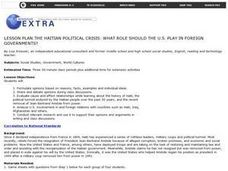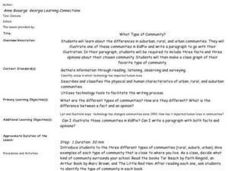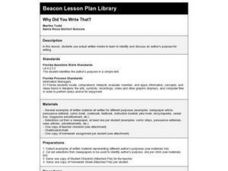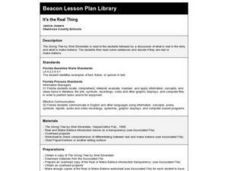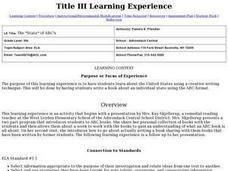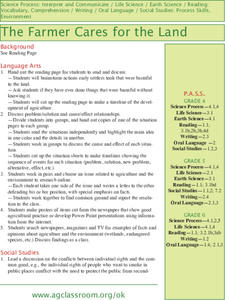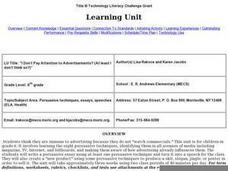Curated OER
The Haitian Political Crisis: What Role Should the U.S. Play in Foreign Governments?
Students examine the political situation in Haiti. They share their opinions on the role the United States should play in foreign governments. They identify the causes of the turmoil in the country as well.
Curated OER
Climate Change
Students discuss global warming. In this global warming lesson, students read an article about global warming and list five things they learned. Students work in small groups to compare what they wrote. Students illustrate one of the...
Curated OER
TE Lesson: I've Got Issues!
Young scholars study environmental issues from different perspectives. They look at the issues from the view of both preservationists and conservationists as they identify themselves with one group or the other. They determine how...
Curated OER
Theories of Crime and Punishment
Students examine goals of two major theories of punishment, Utilitarian Theory and Retributive Theory, develop opinions about ethics and effectiveness of both theories, define legal duties of prosecutors and public defenders, and discuss...
Curated OER
White Collar Crime
Students discuss difference between crimes of deceit versus crimes of violence, define white-collar crime, and examine far reach of white collar crime laws. Students then analyze what differences exist between rationales for punishing...
Curated OER
My Brother Sam is Dead: A study of the Revolutionary War
Fifth graders complete an analysis of the Revolutionary War through literature. After "My Brother Sam Is Dead," students create a time capsule containing items that would be relevant during the Revolutionary War. They identify key...
Curated OER
A Nation Divided
Fifth graders participate in various activities related to the Civil War. In this Civil War lesson students understand the events and feelings of people during the Civil War by studying primary sources, journal writing, readings, viewing...
Curated OER
Imaginary Wealth and a Magazine Article
Students explore economics by writing a fictitious news article. In this personal wealth instructional activity, students participate in a role-playing activity in which the year is 2025 and they must write an article about their...
Curated OER
Analytical Essay
What is an analytical essay? Introduce this type of thinking to your young writers. First, discuss what it means to analyze something. Then, identify the different components of an essay and what details are embedded in each component....
Curated OER
Inference Lesson Plan
Students practice assessing graphics to infer and identify an author's implicit and explicit meaning in a piece of text. They evaluate the effectiveness of information found in maps, charts, tables, graphs, diagrams, cutaways and through...
Curated OER
The Adventures of Huckleberry Finn: Socratic Seminar
After reading The Adventures of Huckleberry Finn and an article about the use of the novel, class members engage in a Socratic seminar focused on whether or not Twain's book should be banned.
Curated OER
What Type of Community?
Students compare and contrast suburban, rural and urban communities. They read books such as The Little Red Hen and identify the type of community in each book. Using computer software, they write about each type of community and...
Curated OER
Cause and Effect
Students identify cause and effect relationships in a short story. After reading a short story, they participate in a discussion of how one event in a story can lead to several others. Students are then paired for a matching task that...
Curated OER
Speak Out!
Students consider their opinions on various topics and issues related to the terrorist attacks on the United States on September 11, 2001. Then, focusing on one specific topic, each student supports his or her opinions in a...
Curated OER
Pioneers Heading West
Young scholars brainstorm, analyze, compare and contrast,
and illustrate accomplishments of pioneers of the west. Students identify and interpret the Pacific Northwest pioneers. Young scholars present their final projects to the class...
Curated OER
Why Did You Write That?
Second graders use actual written media to identify and discuss an author's purpose for writing. They identify the author's purpose in a selection from the newspaper, and write a short description of how they came to their conclusion.
Curated OER
It's the Real Thing
Students listen to a read-aloud of Shel Silverstein's, The Giving Tree, identifying which parts of the story and which are make believe.
Curated OER
The "State" of ABC's
Fifth graders apply the ABC format to write books about various states. They identify important people, places, and events and include title. copyright, and dedication pages. They have items for all letters and createcovers and "about...
Curated OER
Examining newspapers
Students compare and contrast tabloid and broadsheet papers. In this journalism lesson plan, students examine how techniques and form differs from one type of publication to the other. The culminating activity is for students to take...
Pennsylvania Department of Education
Wind and Water Wheels
Students identify wind and water as natural resources that create energy. In this natural resources and energy use lesson, students work in groups to construct a pinwheel, then explore the effects of wind and water on the pinwheel....
Pennsylvania Department of Education
Pennsylvania’s Energy Supply
Third graders become familiar with the various types of energy and which types are found in Pennsylvania. In this Pennsylvanian energy resources lesson, 3rd graders, identify wind and water as sources of energy. Students complete an...
Curated OER
The Farmer Cares for the Land
Students identify cause and effect relationships in issues relating to agriculture and the environment.
Curated OER
Native American Unit
Third graders explore America's history prior to 1492. This unit of six lessons identifies five regions of the United States and assists students in the development of an understanding of the Native Americans who lived in the regions.
Curated OER
I Don't Pay Attention to Advertisements
Sixth graders examine the eight persuasive techniques, identifying them in all avenues of media including magazine, TV, Internet, and billboards, and making them aware of how advertising already influences them. They write an essay using...


